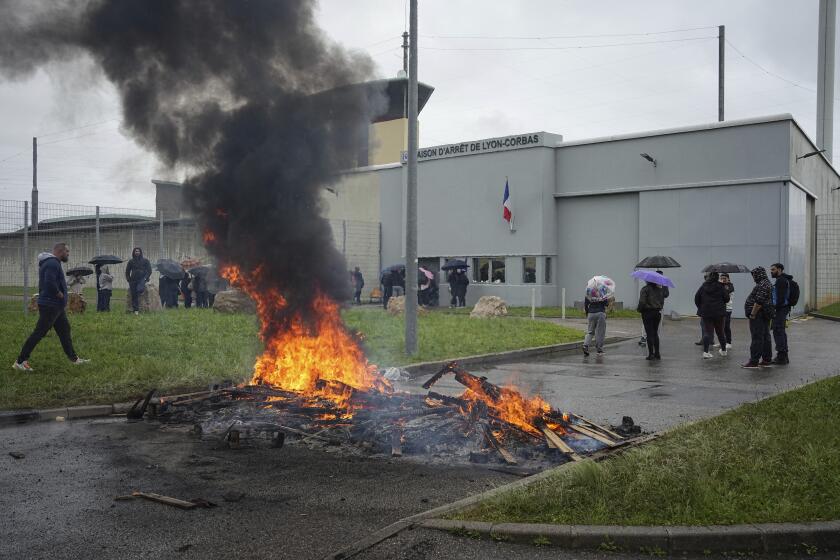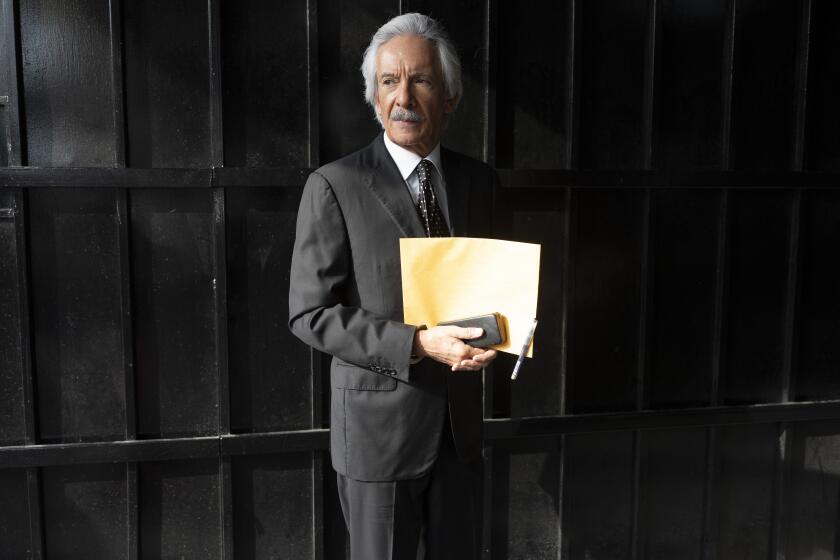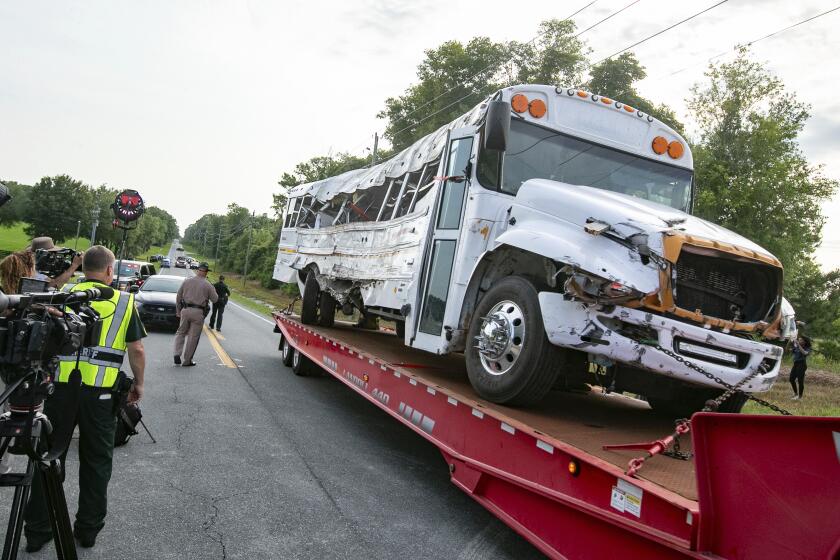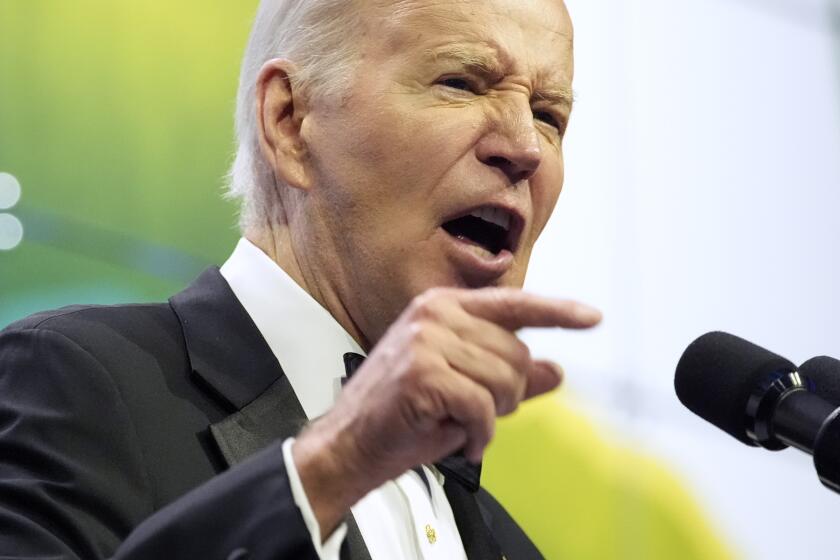U.S. Wants Army of Many in Iraq
The Bush administration’s decision to seek more help from the United Nations in Iraq underscores the difficulty it has had for five months in finding allies willing to take on the risky and unpopular task.
The administration proudly points out that 27 countries are providing 21,700 troops to supplement the force of 146,000 Americans in Iraq. But setting aside the British contingent of 11,000, the remaining nations are providing, on average, just over 400 soldiers each.
A new division under Polish leadership is preparing for duty in southern Iraq, and the Pentagon hopes to find another division early next year to permit some tired American forces to rotate out.
Even so, U.S. officials are not promising that allies will ever shoulder much more than the 13% of the manpower they now provide.
U.S. officials have recently been working hard to win commitments of relatively large numbers of troops -- more than 10,000 each -- from Turkey, India and Pakistan, all of which have large armies. But the U.S.-led war against Iraq is highly unpopular in those countries, and their governments have moved cautiously.
The leaders of Pakistan and India have insisted they could consider providing troops only after passage of a U.N. resolution that would broaden international authority and make such a mission more acceptable at home.
Navtej Sarna, a spokesman for the Indian Foreign Ministry, said that while the government has condemned the bombing of the Baghdad offices, its rejection last month of a U.S. request for troops remains unchanged.
At the U.N. on Wednesday, Pakistani Ambassador Munir Akram said: “We’ve been very clear about what Pakistan requires before we send troops to Iraq. It’s not a question of a U.N. resolution. It’s a question of public opinion and sentiment and how we can assure them we aren’t supporting the occupation.
“There has got to be a call from Islamic people and their leadership. Then we could go to our people and say: ‘This is for the Iraqis. Let’s go.’ ”
In June, Turkey offered to provide 10,000 troops. But the U.S. and Turkish governments are struggling to agree on the terms, and it appears that a deployment could take place only with the blessing of the Turkish parliament. In March, Turkish legislators angered the Bush administration by blocking a proposal to allow U.S. troops to attack Iraq from the north, through Turkish territory.
The Turks would like to command their own forces rather than serve under another allied military.
They would prefer to serve in northern Iraq, even though U.S. commanders have insisted they serve farther south, to avoid potential clashes with their rivals, the ethnic Kurds. And the Turks want the U.S. leaders to make sure that someone else pays most of the costs of any deployment.
Turkish Foreign Minister Abdullah Gul told reporters after a meeting with Sen. Richard G. Lugar (R-Ind.), chairman of the Senate Foreign Relations Committee, that the terrorist attack Tuesday on the U.N. headquarters in Baghdad was a “separate issue” from the deployment.
Bulent Aliriza, an expert on Turkey at the Center for Strategic and International Studies in Washington, said U.S. officials told the Turks in meetings this week that they wanted parliament to approve a deployment before the two governments discussed the terms of such a contribution.
Aliriza said some Turkish officials were already concerned that the legislature could block the plan. Public opinion in Turkey remains “very skeptical, if not hostile,” to a deployment, Aliriza said. “This is not going to be easy.”
The Bush administration has been prodded often in recent months to seek help from other European allies.
Germany, France and Russia, for example, have highly trained and well-equipped militaries. However, the Russian and German governments have made it clear they would not supply troops, even with passage of a U.N. resolution.
A spokesman for German Foreign Minister Joschka Fischer repeated Wednesday that there was “no question” of a German military commitment.
At the United Nations, a diplomat from a European country that opposed the war said the attack on the world body’s headquarters in Baghdad might make the members of the U.N. Security Council, which would vote on any resolution, more inclined to offer help -- including troops -- as long as such assistance was clearly defined to support only the U.N. mission and was not under the command of U.S.-led forces.
Another Security Council diplomat thought sentiments might be changing among countries that opposed the war and the American-led reconstruction of Iraq.
“There is some hope that countries who were reluctant to offer support in Iraq because it might be seen as a retroactive endorsement for the war might change their minds now,” said the diplomat, who requested anonymity.
“Maybe we can see if there is the scope to bring people in to help support Iraq.”
Before the attack, the diplomat said, the question was “ ‘Are you with the coalition or against it?’ The attack potentially changes the question to ‘What can be done to support the U.N. and the Iraqi people?’ But it also raises a question for the coalition side: Under what conditions would they accept that support?”
Yet there were also signs that the bombing in Baghdad, by raising fears about security, might slow some deployments.
Asahi Shimbun, a leading Japanese newspaper, reported that Tokyo might delay the deployment of about 1,000 noncombat military personnel to Iraq. Japan had planned to send the force in November, by which time it had expected that Iraq would be stabilized.
Now, in light of the bombing, the mission will be reviewed, the newspaper said.
Danish Foreign Minister Per Stig Moeller, whose country has sent a military force to Iraq and suffered its first combat casualty last week, called for the French and Germans to join the international force.
“After the attack, additional countries have to join,” he said, adding that “a U.N. mandate has to be worked out.”
Richter reported from Washington and Farley from the United Nations. Times staff writers Ela Kasprzycka in Warsaw, Christian Retzlaff in Berlin and Janet Stobart in London and special correspondents Shankhadeep Chowdhury in New Delhi and Colin Joyce in Tokyo contributed to this report.
More to Read
Start your day right
Sign up for Essential California for news, features and recommendations from the L.A. Times and beyond in your inbox six days a week.
You may occasionally receive promotional content from the Los Angeles Times.







